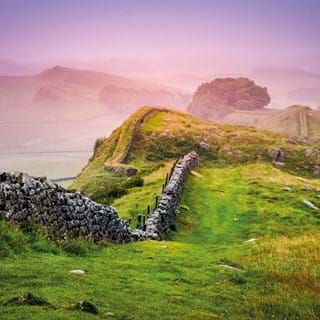
United Kingdom
Archaeological remains show that the first group of modern people to reside in the British Isles were hunter-gatherers following the end of the last Ice Age. Whilst the date is unknown, it is considered to be as early as 8000 BC, but definitely by 5000 BC. They built mesolithic wood and stone monuments, and, between 3000 and 1600 BC, Stonehenge was built.
Britain was a changing collection of tribal areas, with no overall leader as Celtic tribes arrived from mainland Europe. Julius Caesar attempted, unsuccessfully, to invade in 55 BC. The Romans, however, successfully invaded in 43 AD.
Writing was brought to Britain by the Romans and this is when written history began in the country. Rome ruled in Britain from 44 AD to 410 AD, but they only ruled England and Wales. The Romans never conquered Scotland north of the Clyde-Forth valley, or Ireland – their northern boundary changed from time to time, and was delineated for a period at Hadrian's Wall.
Following the Romans, two waves of immigrants came to Britain. Firstly, German tribes: the Angles, Saxons and Jutes. Then, secondly, the Vikings.
For a long period, England was split into various kingdoms. It was unified by Æthelstan (Athelstan) in 945 AD. Subsequently, by force, England and Wales were unified by Edward I (Longshanks) in the 13th century. The union with Scotland took much longer. It was plagued by hundreds of years of conflicts between both parts of Britain. This union between England and Scotland in 1707 formed the United Kingdom of Great Britain, which merged Scotland and England into one country.
So, much of what gives the UK its unique appeal for visitors is the look of its heritage buildings and the age of its ancient monuments. Its majesty is a blend of archaeology, history and heritage.
Upcoming Departures
Visa:
UK: Not required.
USA: Not required for stays less than six months.
Currency:
Pound sterling (GBP).
Packing advice:
In the summer, wear light cotton clothes such as t-shirts, shorts, and sandals. Although, if you are planning to visit the cities and towns, you may want to bring comfortable walking shoes. Pack sunglasses, a sun visor or hat, and sunscreen for the sunnier days. It rains often, so be sure to pack a waterproof coat. In winter, it's advised to wrap up warm as it's often windy and temperatures can fall just below zero.
Cultural differences:
In a country where the favourite dish is an Indian curry and the people drive on the left side of the road, it’s easy to be a little confused about the UK. There are numerous dialects and accents can vary from south to north, and sometimes baffle even the Brits themselves. There are some regional languages including Irish Gaelic, Scottish Gaelic, and Welsh. The official state-sanctioned religion in the UK is the Church of England, which is of the Christian Protestant faith. There has however been a huge decline in the role of the Church in Britain since the middle of the last century, with less than half the population attending church services or believing in God. Modern Britain is a multi-cultural country and minority religions include Islam, Hinduism, Sikhism, Judaism and Buddhism.
Language:
English.
Tipping:
British tipping etiquette is pretty straightforward. Most bills include a form of service fee, and tipping on top of that is a personal choice. In upmarket hotels and restaurants, tips are welcomed, but not expected.
Most restaurants in the UK include a 12.5-15% tip, although it’s not universal. If no service charge policy is stated in the menu, don’t be embarrassed to ask the waiter. You’re not expected to add further gratuity if service is included. If it’s not included, the common tip is 10-15%. In pubs, tipping the barman is not customary. Andante Travels will take care of gratuities to restaurant staff, local guides and drivers.
 US
US
 GB
GB



